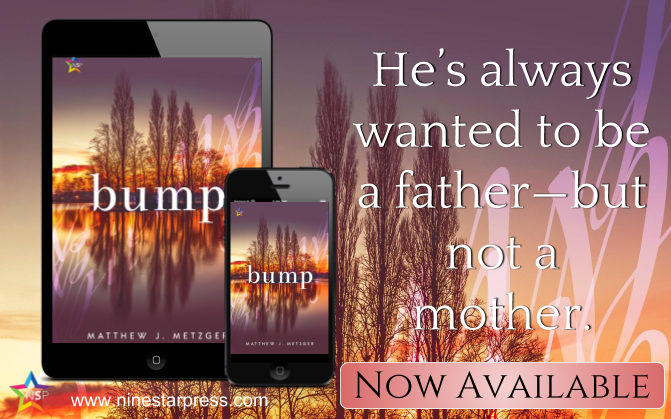
Title: Bump
Author: Matthew J. Metzger
Publisher: NineStar Press
Release Date: November 5, 2018
Length: 70900
Genre: Contemporary, contemporary, trans, bisexual, established couple, interracial, veterinarian, disability/car accident, depression, family issues, homophobia, children, pregnancy, body dysphoria, #ownvoices
Add to Goodreads

Synopsis
David’s pregnant.
He’s always wanted to have children, and being a stepfather for the past two years has been a great adventure. There’d even been a plan to start looking into adoption and turn their family of three into four.
But now there’s a bump, and David doesn’t know what to do. He’s spent years escaping the grip of his own body and burying the past—but there’s no way he can hide from his history if he lets the bump get any bigger. It’s not just his baby; it’s also his breakdown.
He doesn’t know if he can do this.
A Matter of Opinion
This post is more for other authors than readers, so I do apologise, but it’s been on my mind for a while now.
Do you ever write characters who disagree with you?
I don’t mean little things like favourite food or whether 80s music was any good. I mean the big ones. The big debates you don’t have at the family table on Christmas Day, because it’ll ruin the whole holiday. God. Politics. Pro-life or pro-choice. For the Americans in the room, gun laws. For the Brits, Brexit. The ones that should be avoided at all costs, unless you’re rooting for a good fight over the mashed potatoes.
In my latest novel, Bump, I found myself in some pretty dangerous waters with opinions. The story is about David, a trans man who accidentally gets pregnant. And his first reaction—despite actually wanting to have a child with his partner, Ryan—is to get an abortion. He can’t do this. He can’t cope with being pregnant. That’s his immediate response.
And then I paused.
There was no way around that being David’s initial reaction. It was exactly the way that man would have responded. He was terrified of being pregnant, didn’t want to be pregnant, didn’t even think he could get pregnant. There was no way he wouldn’t jump straight to finding a way out.
But this put me in a bit of a tight spot. I didn’t want to come down on either side in the abortion argument. I didn’t want to construct a narrative saying, “Welp, you’re pregnant now, too late!” But I didn’t want to form one either that said, “You’re a man, men don’t have kids, get rid of it.” I already knew neither had any religious bearing from the backstories I’d created for them both, but I still needed to tread carefully in a talking-about-it scenario. Ryan couldn’t have no opinion—he loved his daughter, he desperately wanted another baby, he was getting geared up to start the adoption process and thoroughly excited about it. But he couldn’t control the decision, either, because it was David who was going to be carrying it, and David’s body and mind that would undergo the majority of the stresses. I had to construct their conversation incredibly carefully in order to keep a relatively impartial narrative.
(I’ll leave it up to readers about whether I pulled this off.)
It got me thinking more about opinions. When is an opinion the character or the author? Are certain opinions just wrong and should never be held by a hero? Who decides what those unforgivable opinions are? Do they change from genre to genre? As an author, do you give your characters different opinions from you on the big stuff? As a reader, do you like to see a variety of these opinions, or play it safe and stick to the answers that you agree with?
To a small degree, I’ve done it before—Ashraf in Life Underwater is a practising Muslim, whereas I probably catch fire if I enter religious buildings—but it’s never been particularly plot-relevant before. Bump ran straight into it, and I had to sit back and decide whether to include opinions other than mine, or stick to what I believe.
In the end, I diverted…briefly. And relatively safely. David’s mum is—well, a mum. She fusses at him for being too thin, dotes on her step-granddaughter, threatens him with a beating for being cheeky even though he’s thirty-two, and still very plainly thinks of him as a slightly dim-witted child at times, who really ought to know by now that Mother Knows Best. When she finds out he’s pregnant, she’s over the moon at the prospect of her first ‘grandbaby.’
Because of course he’ll keep it. It’s a baby. You can’t get rid of a baby.
This is where I diverted. Hopefully safely, with a generally very likeable character who plainly loves her family. But it was a diversion, nonetheless. David’s mum is plainly pro-life, whereas I am equally firmly pro-choice.
But it was—fun.
It made her more real in my mind. She wasn’t a side character anymore. She was a person who disagreed with me. She had opinions that weren’t mine, and she expressed them. She was a challenge to what I believed.
And she helped me justify what I believed. Not only did I have to think about the abortion argument more in order to make her beliefs relatable, realistic, and somewhat sympathetic (given she’s not the villain of the piece!) but in doing so, I had to examine why I believed what I did.
Books can be comfort reads. They can be safe spaces. They can be there to console you. But they are also there to learn from, to teach, to challenge you, to force you out of your comfort zone sometimes and take in another part of the world that you weren’t seeing before. And that’s true for the author as well as the reader.
So do it.
Next time you write a story, find one of the big ones. And make your hero believe something that you don’t agree with.
Because trust me, it’ll help you just as much as it’ll help your story.
Bump
Matthew J. Metzger © 2018
All Rights Reserved
Chapter One
“Thank you,” David said. “Yes. I’ll check my diary and make an appointment. Yes. Thank you. Goodbye.”
He hung up and—very calmly—dropped the phone out of the car window. Wound the window back up. Reversed a little to give himself room to wriggle out from behind the BMW in front.
And—just as calmly—made sure to run over the phone with the rear tyre as he drove off.
His palms were sweaty on the steering wheel. His heart was thundering low in his stomach. David hadn’t had a panic attack in nearly ten years, but the feeling was as familiar as ever—the creeping darkness at the edges of his vision, the hyperawareness of his own skin, the tightness across his ribs like he was having an asthma attack. He tightened his grip. He needed to get control of himself. He was thirty-two years old. He could—would—handle this like the responsible adult that he was.
He refused to break down screaming at the wheel of a car, for God’s sake.
Thankfully, the phone call had happened just around the corner from his usual parking spot. He slid the car into a free space and bent forward to rest his forehead on the wheel. He raked a deep breath in, held it for a count of ten, and let it out slowly.
All right.
So the test result was more or less his worst nightmare. And he’d probably be having nightmares too.
But it could have been worse. Practically speaking. It was a fixable nightmare. He could fix it. It didn’t matter right now. He didn’t have to deal with it this minute. He could talk to Ryan tonight, make an appointment in the morning—just not the one he’d promised the nurse on the results line—and fix everything.
Slowly, his heart rate started to come down out of the rafters. The tight band around his chest didn’t ease, but it got a little easier to breathe.
“Fix it tomorrow,” he mumbled.
He straightened, squared his shoulders, and opened the door.
David never bothered trying to park right near the school. It was always a melee of mums and Mitsubishis, and he was terrified of someone’s kid running into the road right under his bumper. It was cool outside, threatening rain. The short walk helped clear the rest of the panic out of his head, and refocus. Ava didn’t need to know about it. Everything was fine, all happy and normal, no problems whatsoever, nothing.
The school gates were crowded as always, but David had an advantage. In a sea of white mums, he stood out a mile. He leaned against the metal fence, peering through the railings, until he caught sight of two frizzy baubles of hair stuck out either side of a pair of wide, searching eyes.
He waved, and the eyes lit up.
“David!”
“Sorry, excuse me, sorry, thanks, sorry—”
He wrestled his way to the front just in time to stoop and catch Ava as she hurled herself at his thighs. He hoisted her up and turned to carry her through the crowd. She babbled in his ear about finger painting, pizza, and a new gold star on her behaviour chart, and then clung obstinately when he dropped her to the pavement again.
“Only babies need carrying during the daytime,” David said. “You’re not a baby anymore, are you?”
It had been an infallible obedience tool ever since she started school. She let go with a sulky expression and jammed her sticky hand into his.
“Can we have pizza?” she repeated.
“We’ll ask Daddy.”
“Daddy never says yes to pizza,” Ava said mournfully, in the same tone of voice one might use to say someone had died.
“Daddy doesn’t eat pizza,” David corrected. “That doesn’t mean we can’t have pizza sometimes. You had pizza on your birthday, remember?”
She brightened up. “It was Jamie’s birthday today!”
“That’s nice.”
“So we can have pizza for Jamie!”
“I don’t think it works like that.”
Her buoyant mood was calming, even if Ava was more of a hurricane than anything else. She was five and three-quarters (never just five) and brimming over with energy. She didn’t even have the decency to get tired by seven o’clock like normal five-year-olds. She went to bed at the same time as her parents—and usually rocketed back out of it again by six o’clock the next morning.
Still, her effusive enthusiasm helped. There was nothing to panic about. He could fix things, and everything would be back to normal next month anyway.
“Tell me about your new gold star,” he said as she scrambled up into the back seat. “Do you need help with your seatbelt?”
“No,” she said, giving him a look definitely inherited from her mum. “I’m five. And three-quarters. I can do my own seatbelt.”
“Show me,” David said.
To be fair, she could. Albeit with a lot of faffing about. Once he heard the click, he promised a new star for her chart at home and closed the door. In the short time it took him to walk around the car and get into the driver’s seat, she’d started a whole new deluge of noise masquerading as conversation, all about how rainbows were made.
David’s chest slowly unlocked as he drove home to the background noise of a five-year-old on rainbows and a fifty-year-old on the radio. He could hand her off to Ryan once they were back, lock himself in the bathroom, and have a cry in the shower under the pretence of a long, hard day at work. Maybe even have a soak in the bath. He felt bad palming Ava off on her dad, especially on a Thursday, but—
Christ.
He just didn’t have the energy. Not after that phone call.
Home was a roomy bungalow with a long, narrow back garden, a decent view over some fields, and the ugliest bay windows in the front David had ever seen. According to the locals, it was in a village near Wakefield. According to everyone else—including David, who wasn’t even from Yorkshire and was therefore regarded as an immigrant—it was in Wakefield. The rest of the street was occupied by elderly white people called Gerald and Betty whose lives revolved around gardening, Antiques Roadshow, and Women’s Institute bake sales.
Ryan and Ava had been acceptable when they first moved in. Cute toddlers were tickets to acceptance in these sorts of villages, David suspected. And he’d found out the other week that half of them thought Ryan was ex-army, which meant all the old blokes liked him by default. But when David moved in, that popularity had taken a definite dive.
David didn’t really care. He was from Salford. He could think of a lot worse than some tuts and disapproving scowls from ninety-six-year-old Pamela next door. She was there, peering out from behind her lace curtains, as he pulled into the drive. He waved, and the curtain dropped.
“We’re going to be nice and quiet,” he told Ava as he opened the door to let her out of the car. “Daddy went to see Nathan this morning, so he might still be tired.”
Ava nodded, dragging her bag out after her.
“If Daddy’s asleep, can we have pizza before he wakes up?” she chirped as David unlocked the front door.
“Nope, Daddy will want dinner too.”
“But—”
“Aha!”
Ryan’s booming voice bounced down the hall towards them as David opened the door. Ava squealed and shot into the kitchen, jumping up at her dad like she hadn’t seen him in a thousand years rather than eight hours.
“Hello, my little star!” He planted a loud kiss on her cheek and grinned up at David. “What’s this? Two stars! Well, well, well. What have I done to deserve this, eh?”
Then he smiled, a brilliant flash of white streaking across his face like torchlight. And David—relaxed.
That was all it took sometimes. Just for Ryan to flash him that megawatt grin, and all the fight seemed to drain out of David’s body. Even the internal fight. Ryan had that—that air about him. When he smiled, when he laughed, when he was happy, it was like the whole world had to be happy as well. It was like everything faded away and was replaced with a warm contentment, a feeling of security, the sense that no matter what happened, he had Ryan with him.
He hadn’t fallen in love with Ryan at first. He’d fallen in love with that smile.
In a lot of ways, Ryan was a ball-ache of a boyfriend. Complete slob. Rap fan. Thought curries every night were compatible with a sex life. David had become a de facto stepdad not three months into their relationship from the sheer number of times Ryan simply forgot which weekend he was supposed to have Ava, and had had to ring David on his way home to swing by the school and pick her up.
But Ryan made him feel—
Warm.
And David could use warm. Unceremoniously, he hoisted Ava up by the armpits, plonked her on the kitchen tiles, and sat in Ryan’s lap looping both arms around his shoulders and burrowing his face shamelessly into that thick neck.
Purchase
NineStar Press | Amazon | Smashwords | Barnes & Noble | Kobo

Matthew J. Metzger is an ace, trans author posing as a functional human being in the wilds of Yorkshire, England. Although mainly a writer of contemporary, working-class romance, he also strays into fantasy when the mood strikes. Whatever the genre, the focus is inevitably on queer characters and their relationships, be they familial, platonic, sexual, or romantic.
When not crunching numbers at his day job, or writing books by night, Matthew can be found tweeting from the gym, being used as a pillow by his cat, or trying to keep his website in some semblance of order.
Website | Twitter








